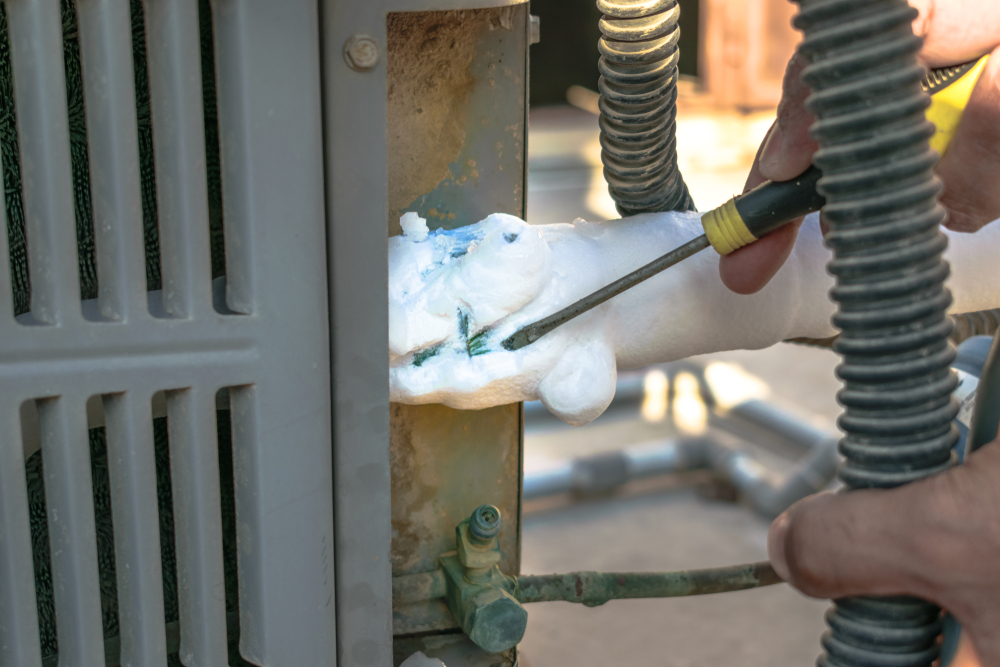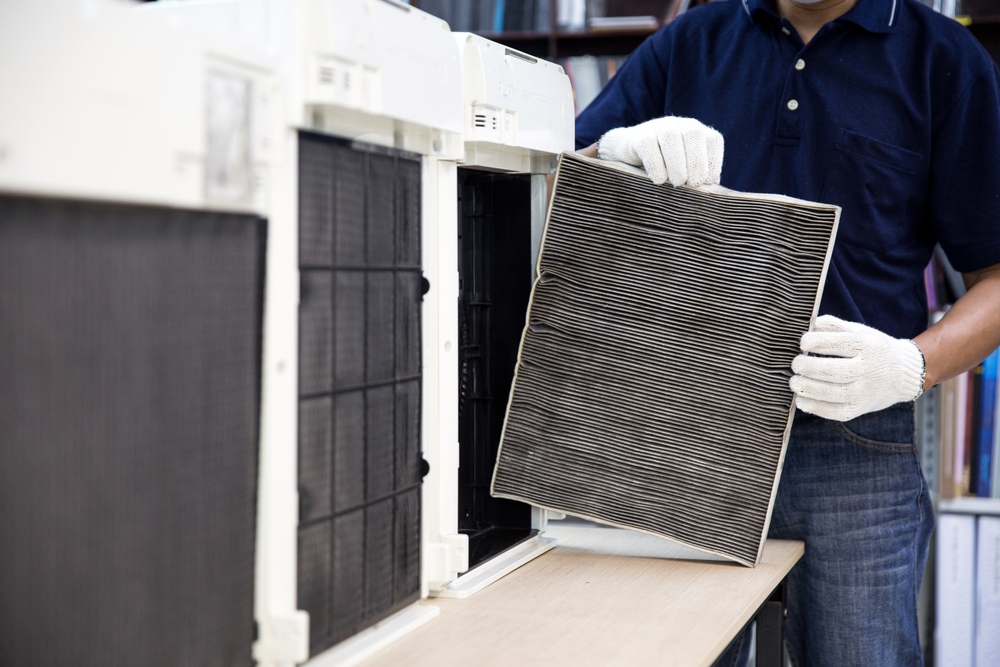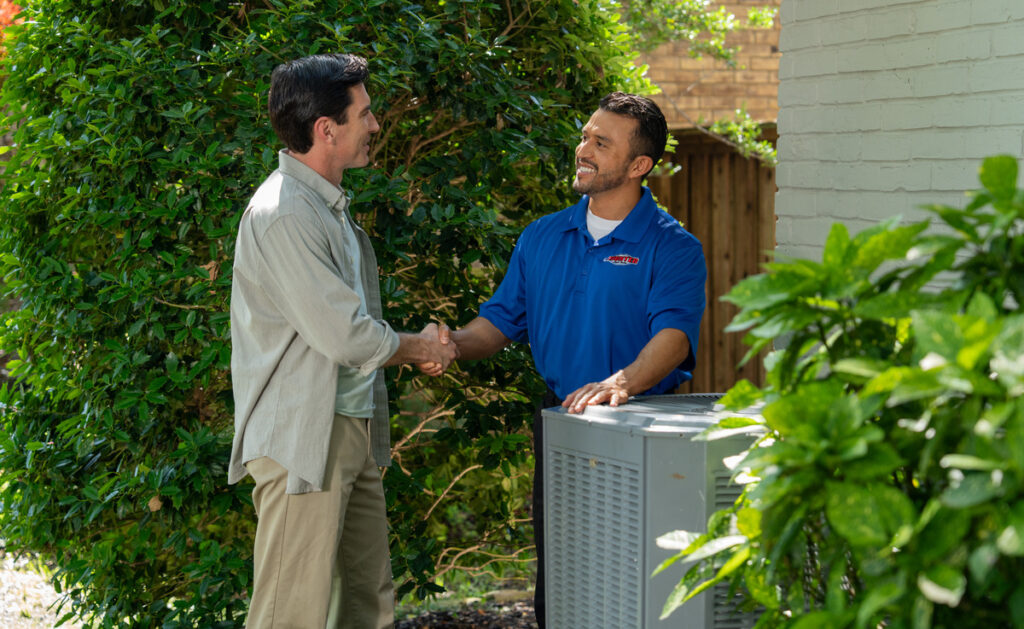Why Your Home Stays Humid with The AC Running (And How to Fix It)

A damp and sticky home often leaves people asking: “Why is my house so humid with the AC on?”
If your air conditioner is running but your home still feels humid and sticky, you’re not alone. High indoor humidity levels, despite a working AC, can be frustrating and even harmful to your home and health.
Continue to learn why your air conditioner might be falling short and how Hunter Super Techs can help restore your indoor comfort.
Table of Contents
Understanding AC and Humidity Removal
Most homeowners think of air conditioning systems as cooling machines, but they’re also designed to remove humidity from the air. As warm indoor air passes over the cold evaporator coils in your AC system, moisture in the air condenses into water droplets, which are then drained. This helps lower the humidity level inside your home.
If any part of this process fails, you may notice that your AC is blowing humid air instead of cool, dry air. This can lead to discomfort, condensation, and even mold growth if ignored.
8 Reasons Why Your Home is Humid with the AC Running
There are several mechanical or environmental reasons why your AC might be cooling the air without properly dehumidifying it. Let’s take a closer look at them:
1. Frozen Evaporator Coils
Frozen coils prevent your AC from properly removing moisture. When coils ice over, they can no longer absorb heat or humidity, causing the system to circulate cold, clammy air.
This issue is often caused by restricted airflow, typically due to dirty filters, low refrigerant, or a malfunctioning blower motor. If left untreated, it can damage the compressor, leading to costly repairs.

2. Dirty Condenser Coils
If your air conditioner’s condenser coils are covered in dirt or debris, your unit will have to work harder to cool your home. This can leave your home feeling humid and sticky, especially on hot days when your system is already under strain.
Routine air conditioning maintenance can help prevent this issue and keep your system running efficiently.
3. Aging Air Conditioning System
Older AC systems simply don’t perform as well. Components wear out, refrigerant levels drop, and efficiency declines over time. If your system is 10–15 years old and struggling with both temperature and humidity control, it may be time to consider replacing your air conditioner.
4. Thermostat “On” vs “Auto”
If your thermostat fan setting is switched to “On” instead of “Auto,” your AC’s fan will run continuously, even when the system isn’t actively cooling. This means it could be circulating warm, humid air back into your home between cooling cycles, rather than allowing moisture to be properly removed.
Switching your fan setting to “Auto” allows the system to cycle off when not cooling, giving condensed moisture time to drain correctly.
5. Incorrect AC Unit Size
Bigger isn’t always better. An air conditioner that’s too large for your home won’t be able to work properly, shutting off before it has a chance to dehumidify the air. On the other hand, an undersized unit may run constantly and never quite reach the right temperature or humidity level.
A load calculation performed by an HVAC professional ensures that your system is appropriately sized for your home’s square footage, insulation, and climate.
6. Leaking Ductwork
If your air ducts are leaking, they could be pulling in warm, moist air and redistributing it throughout your home. Leaky ductwork also reduces airflow, making it more difficult for your AC to regulate temperature and humidity levels.
Sealing your ductwork can significantly improve comfort, energy efficiency, and indoor air quality.

7. Dirty Air Filters
A clogged or dirty air filter restricts airflow to the evaporator coils, which can lead to freezing, decreased efficiency, and—you guessed it—higher indoor humidity. Regular air filter replacement helps maintain airflow and ensures your system can remove moisture from the air.
Make sure to check your air filters every 1–3 months, especially during peak cooling seasons.
8. High Outdoor Humidity
Sometimes, the issue isn’t your AC—it’s the weather. On extremely humid days, even a well-functioning system may struggle to keep up with the excess moisture seeping into your home through windows, doors, or poorly insulated areas. This can be a pervasive problem in the humid climates of North Texas and Southern Oklahoma.
Weatherstripping, dehumidifiers, and improved ventilation can all help mitigate the effects of outdoor conditions on indoor humidity levels.
Solutions and Best Practices for Reducing Indoor Humidity
If you’re experiencing high humidity in your house, try these expert-backed solutions to improve your comfort:
- Switch your thermostat to “Auto” mode – This prevents your fan from blowing humid air when the system isn’t actively cooling.
- Schedule regular air conditioning maintenance – Regular maintenance can catch issues before they become a problem. Learn more about air conditioning maintenance.
- Replace air filters frequently – Dirty filters restrict airflow and contribute to coil freezing. Follow a 30–90 day replacement cycle depending on usage and home conditions. Find replacement options through our air filter replacement services.
- Seal air leaks in your home – Cracks, poor insulation, and gaps around windows or doors allow humid outdoor air to enter. Sealing these areas helps your AC work more efficiently.
- Use a whole-home or portable dehumidifier – Dehumidifiers remove excess moisture your AC might miss, especially during periods of high outdoor humidity.
- Ensure your home’s ductwork is sealed and insulated – Duct leakage pulls in moisture from attics and crawl spaces. Professional duct sealing can prevent this and boost overall comfort.
- Upgrade to a variable-speed AC or zoning system – Modern air conditioners run longer at lower speeds, which improves humidity removal and balances temperatures.
- Consider a replacement if your system is outdated – If your AC is 10–15 years old, an upgrade could solve both cooling and dehumidifying issues. Explore air conditioning replacement options with Hunter Super Techs.

When to Call a Professional
Still wondering why your house is so humid with the AC on?
If your AC system has been running constantly but your home still feels muggy, it’s time to call a licensed HVAC technician. Persistent indoor humidity could indicate deeper mechanical issues that DIY solutions won’t fix.
A professional can inspect your system, check your ductwork, and make expert recommendations tailored to your home. Get ahead of the problem and give Hunter Super Techs a call.
Contact Hunter for Professional AC Maintenance
You don’t have to live with sticky, uncomfortable indoor air. Whether your AC is overdue for a tune-up or it’s time for an upgrade, the experts at Hunter Super Techs are here to help.
We’ll inspect your system, diagnose the issue, and recommend the most effective fix so your home stays cool and comfortable all season long. From air conditioning maintenance to replacement, you can count on our team to keep humidity at a low, comfortable level.
Contact Hunter Super Techs to schedule your service and take control of your indoor air.
